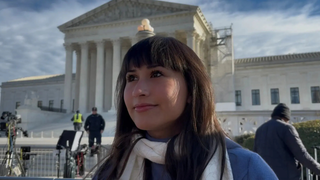In September 2010, I was at the top of my field, working as an Army explosive ordnance disposal expert in Afghanistan. And then a bomb exploded beneath me.
When I awoke days later in Walter Reed Army Medical Center in Washington, I had to grapple with the realization that my legs, along with my usefulness on the battlefield, were likely gone. I would never be an asset to a mission again. If anything, I would be a detriment.
This Veterans Day, however, I now know that I was one of the lucky ones. My injuries were visible – plain for all to see. I was the beneficiary of endless support from doctors, people in our community and veterans organizations that helped me through recovery and helped me to realize I was still only limited by my own drive, grit and determination.
When people see my two legs are missing, they know immediately the assistance I need – help down a step, a cane, or a friendly shoulder to lean on. The kindness of everyone – even complete strangers – brings me feelings of immense gratitude.
Rarely a week goes by that I don’t get a call from a veteran who is struggling with suicidal thoughts. As a society, and especially as a military family, we must do more to support these men and women who return home with the injuries we cannot see.
But many scars of our nation’s wounded warriors are not visible. The recurring memories of an intense moment of combat, the damp feeling of a friend’s blood soaking your own uniform, and the sound of a brother’s last gasp of air will stay with me and my fellow warriors all our lives.
For many, these memories will be a part of a haunting labeled to most as post-traumatic stress. Far too often, my peers are haunted in silence without the same support of a grateful nation encouraging them through their struggle.
Rarely a week goes by that I don’t get a call from a veteran who is struggling with suicidal thoughts. As a society, and especially as a military family, we must do more to support these men and women who return home with the injuries we cannot see.
I’m now a member of Congress from Florida, waging a different kind of battle: to give America’s military veterans the help they have earned for defending our country.
One way we can support these men and women is by passing a bill that I introduced earlier this year called the Oath of Exit. Working with those who have experienced the weight of post-traumatic stress firsthand, I and others wrote the Oath of Exit to be a strong step forward in doing all we can to prevent even one more veteran from harming himself or herself.
The Oath of Exit creates a voluntary pledge for members of the armed forces to ask their brothers and sisters in arms for help – and to provide help when called upon.
That help is badly needed. According to the Department of Veterans Affairs, an average of 20 veterans commit suicide every day and a veteran’s risk of suicide is 21 percent higher compared to an adult who has not served in the armed forces.
Coupled with increased awareness and resources to help these veterans, the Oath of Exit will provide an even stronger culture of support within our military family to combat these awful trends.
The Trump administration and Congress have already made supporting veterans a top priority. Just this week, the House passed more than a dozen bills to support veterans and improve the Department of Veterans Affairs.
But there is much more work that needs to be done. The Oath of Exit passed the House earlier this year as a part of the National Defense Authorization Act, but wasn’t included in the Senate version of the bill. We need another strong push to get the Oath of Exit across the finish line.
This should not be a partisan issue. On deployments around the world and at military bases in our own country, there are no Democrats or Republicans – only American patriots, proudly wearing the uniform of the Army, Navy, Air Force, Marines or Coast Guard.
Our military culture is one where the most important commitments are consistently spoken. The Soldier’s Creed, Ranger Creed, Special Forces Creed, Warrior Ethos, Army Values and Pledge of Allegiance are all examples of statements we put into heartfelt words.
These are the pledges that are important for us to uphold, so we repeat them nearly each day. This is because honor is more than just a word to members of the military and veterans. When we commit to something, we follow through.
This Veterans Day, my request of all my fellow Americans – beyond celebrating the amazing patriots who have defended America in an unbroken line since 1775 – is to remember that not all injuries of war look the same. Many don’t look like anything.
Take a moment to thank the veterans in your life this Veterans Day, but more importantly, speak with them, really connect with them and let them know you’ve got their six.








































